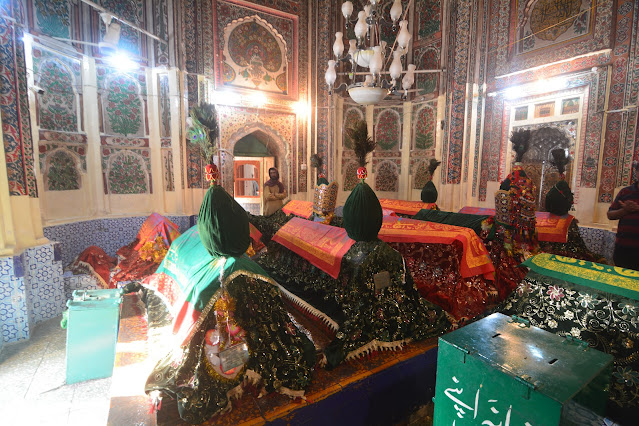23rd February, 2020
Sachal Sarmast was born in 1739 in the village of Daraza, which is now located in the Khairpur district of Sindh province, Pakistan. His real name was Abdul Wahab, but he became known by the name Sachal Sarmast, which means "truthful mystic" in Sindhi.
He was raised in a family of Sufi
scholars and became a disciple of the Sufi saint and poet Shah Abdul Latif
Bhittai at a young age. He spent many years studying and practicing Sufism, and
his poetry reflects the influence of his spiritual mentor.
He was not only a poet but also
a musician, and he played the flute and the Durango, a traditional Sindhi
musical instrument. He composed music to accompany his poetry, and his songs
and poems became popular among the people of Sindh. Sachal Sarmast was known for
his simple and humble lifestyle and his devotion to God. He was a proponent of
universal love and believed that the essence of Sufism was to love and serve
humanity.
Sachal
Sarmast died in 1827 in Daraza, and his shrine has become a popular pilgrimage
site for his followers and admirers. His legacy continues to inspire and
influence the Sufi culture and literature of Sindh province and beyond.
His poetry is characterized by
its simplicity, depth, and spiritual message. His poems express his deep love and
devotion to God, and they offer insights into the mystical aspects of Sufism.
Here are a few examples of his poetry:
"Dedan
Mein Dedan, Aahin Dilan Mein Aahin": This poem emphasizes the importance
of love and devotion to God. It says that God is present in every heart, and
that by loving Him, we can attain spiritual enlightenment.
"Kafi
Surzindagi Dha Jeevay": This poem reflects on the transience of life and
the importance of living in the present moment. It says that life is like a
flame that can be extinguished at any moment and that we should cherish every
moment we have.
"Sugharre
Manhun Na Bhaavo": This poem speaks to the idea of detachment and the need
to overcome the ego in order to attain spiritual enlightenment. It says that we
should not be attached to worldly possessions or pleasures and that we should
strive to attain inner peace and contentment.
"Maseeha
Saaeen Samaan Je Naal": This poem reflects on the idea of the spiritual
guide or mentor, who can help us on our journey towards enlightenment. It says
that the spiritual guide is like a companion who can show us the way and help
us overcome our inner obstacles.
Overall,
Sachal Sarmast's poetry offers a profound message of love, spirituality, and
the search for inner peace and enlightenment.
There
is no other Beloved,
There
is only what I see every day!
I was
sitting by the roadside,
When
the path became clear to me;
In the
Palace the Beloved I saw,
a
glimpse the Beauty gave;
Through
the window was the vision,
a
glimpse the Beauty saw;
Take
care of the ignorant;
Our
bond was made for a reason.
I
truly recognized the Lord,
My
companion He sure became;
‘He is
the Creator of all
and
intrinsic to all’,
All
doubts in this perished.
With
happiness shall I carry
Sisters,
if your trust I have.
All
the journeys, all the manifestations
The
Dear One’s own;
Friend
‘Sachal’ know this correctly,
Slumber
has created illusions.
‘Tis not
in religion I believe.
‘Tis
love I live in.
When
love comes to you.
Say
Amen!
‘Tis
not with the infidel
that
love resides
Nor
with the faithful.
Friend,
this is the only way
to
learn the secret way:
Ignore
the paths of others,
even
the saints’ steep trails.
Don’t
follow.
Don’t
journey at all.
Rip
the veil from your face.
Neither
did I roll the rosary, nor did I ponder and pray,
I went
to no mosque or temple, nor bow in adoration to any,
Sachal
is lucky every day, love is all around him.
You by
yourself, know what is in your form!
Why
chant ‘Allah Allah’? Find Allah within you.
You
listen, you see, Allah’s word is witness,
There
is no doubt, O Sachal! that the Lord is One!
We
are, what are we?
We
know not, what we are!
For a
moment we are blessed
For a
moment we are accursed
Some
moments we pray and fast
Some
moments we are free spirits
Now we
declare, ‘Only we exist
Now we
declare, ‘We don’t exist
For a
bit, our heart is calm
In a
bit, we weep rivers
Now we
say, ‘We are self-realized
Now we
ask, ‘Who are we?’
‘Sachal’
we are only That eternally
What
other contracts can we make here?




















No comments:
Post a Comment